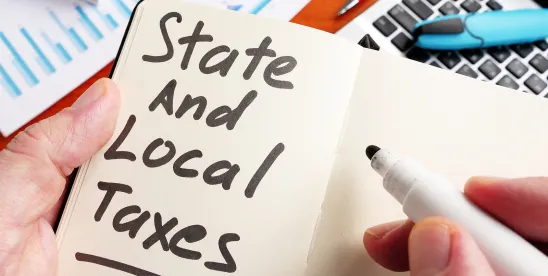Efforts to amend and expand P.L. 86-272 protections have been front and center since the introduction of H.R. 427 (Interstate Commerce Simplification Act of 2025) in January 2025. The language from H.R. 427 was recently added to the House’s budget reconciliation bill, H.R. 1, the One Big Beautiful Bill Act (OBBBA). The House passed the OBBBA on May 22, 2025. Specifically, section 70301 of the OBBBA would expand and clarify the scope of P.L. 86-272’s protections. Note however, this provision is subject to modification as the Senate considers changes to the bill.
P.L. 86-272 was originally enacted in 1959 and is a federal preemption that prohibits states from imposing a tax on net income if a business’s only activity in the state is the solicitation of orders for sales of tangible personal property. The proposed amendments to P.L. 86-272 would redefine “solicitation of orders” to include any business activity that facilitates the solicitation of orders, even if the activity serves an independently valuable business function. This change is particularly significant for businesses engaging in internet-based activities and may be in response to recent activities in several states.
Summary of Changes to P.L. 86-272
Redefining “solicitation of orders” may protect certain internet-based activities from state net income taxes, including maintaining websites, providing online customer support, and utilizing digital tools to interact with customers. These amendments appear designed to counteract state efforts to narrow the protections of P.L. 86-272. Such efforts include interpretations the Multistate Tax Commission (MTC) advanced in its updated “Statement on P.L. 86-272,” which the MTC adopted in August 2021. By explicitly expanding the definition of what constitutes solicitation, the OBBBA seeks to expand P.L. 86-272’s protections to include activities ancillary to the sale of tangible personal property.
MTC’s Updated Statement on P.L. 86-272
Since 1986, the MTC has maintained a statement on P.L. 86-272 that has provided guidance as to what constitutes protected “solicitation activities.” The MTC’s statement, which many states rely upon, has been considered a potential overreach by states attempting to interpret federal law. In 2018, the MTC began a project to update the statement following the Supreme Court’s decision in Wayfair v. South Dakota.1 Despite Wayfair not addressing P.L 86-272, some MTC staff and state representatives asserted the Court’s decision signaled a change in the overall state tax landscape, requiring MTC’s statement on P.L. 86-272 be reviewed and updated to address businesses’ internet activities. Some in the business community took issue with the project seeking to expand the list of unprotected activities, including placing cookies on users’ computers, providing post-sale customer support via email or chat, and online hiring practices. Despite opposition to the project, the MTC ultimately adopted the updated position in its Statement on P.L. 86-272.
State-Level Developments
California: Invalidated Guidance on Internet Activities
On Feb. 14, 2022, the California Franchise Tax Board (FTB) issued Technical Advice Memorandum No. 2022-01 (TAM) and FTB Publication 1050, adopting the MTC’s updated Statement on P.L. 86-272.
However, a California state court struck down that guidance in December 2023 in American Catalog Mailers Association v. Franchise Tax Board (see our December 2023 GT Alert for more).2 Specifically, the court ruled that the FTB’s guidance constituted an “underground regulation” because it was not enacted in compliance with California’s Administrative Procedure Act. While the court did not address whether the guidance substantively violated P.L. 86-272, the ruling voided the TAM and FTB Publication 1050 on procedural grounds.
New York: Internet Activities Rule Upheld but Limited in Scope
In a parallel development, the New York Department of Taxation and Finance (Department) adopted the MTC’s updated Statement on P.L. 86-272 as a regulation in December 2023. As adopted, the regulation was effective retroactively to Jan. 1, 2015.
The Department’s regulation was also challenged, and in April 2025, a New York trial court upheld the Department’s regulation in American Catalog Mailers Assn. v. Department of Taxation & Fin.3 The court recognized that the regulation could not be applied retroactively to tax years prior to the date the regulation was published in final form (December 2023), citing due process concerns. The court explained that taxpayers had no opportunity to adjust their behavior in anticipation of the rule’s retroactive application, and the nearly nine-year look-back period was excessive.
This case has been appealed to the New York Appellate Division Third Department, signaling the Department’s willingness to push the retroactivity issue. Additionally, the rule currently remains in place for prospective application. Businesses operating in New York should evaluate their activities to enhance compliance with the state’s interpretation of P.L. 86-272.
Other State Activity
In August 2022, the Oregon Department of Revenue opened a Rules Advisory Committee (RAC) to advise on adopting the MTC’s updated Statement on P.L. 86-272. The RAC members’ opposition to the adoption was significant, and the Department declined to move forward formally with a rule.
In April of 2023, the Minnesota Department of Revenue circulated a draft revenue notice that would adopt the MTC’s updated Statement on P.L. 86-272. To date, that draft revenue notice has not been finalized.
Most recently, in February and March 2025, the New Jersey Division of Taxation and the Massachusetts Department of Revenue, respectively, proposed rules that would adopt the MTC’s updated Statement on P.L. 86-272. To date, neither rule has been finalized.
Takeaway
If enacted, the amendment proposed in the OBBBA would represent the first update to P.L. 86-272 since its passage in 1959, and the change may have significant implications for businesses operating across state lines. While this expanded definition of solicitation activities may generally be beneficial for businesses seeking to limit multistate tax liability, it might create additional tax exposure, specifically in states that still have a “throwback rule.” Additionally, it is unclear as to whether the proposed amendments to P.L. 86-272 are suitable for a reconciliation bill.
Further, as states continue to adopt and enforce the more stringent interpretation of P.L. 86-272, as reflected in the MTC’s updated Statement seeking to limit the impact of the digital economy, businesses should be mindful of these changes in order to navigate the shifting landscape and mitigate potential risks.






 />i
/>i
